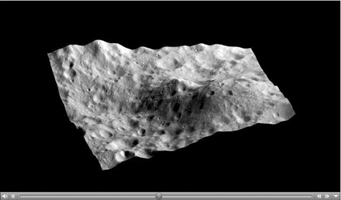
Click on the image for the videoThis animation created by David O'Brien, Planetary Science Institute, Tucson, Ariz., and taken with NASA's Dawn framing camera instrument, shows an image layered on a the digital terrain model of an unusual hill containing a dark-rayed impact crater and nearby dark deposit. The hill is about 26 miles (42.5 kilometers) long by about 17 miles (28 kilometers) wide, and appears to be sculpted by impact craters. The dark deposits on this hill, visible in approach images, first suggested that this hill was a possible volcano, but the lack of any clear evidence of extrusive volcanic features on the hill suggests that it is more likely a dike, or magmatic intrusion, that is being eroded and exposed by impact craters. A key test of this will be to determine if there are any compositional differences in the dark material exposed by the dark-rayed crater, and the dark material on the northwest slope of the hill. Thus far, there has been no unambiguous evidence of volcanic materials identified on Vesta, in contrast to models and expectations.
The Dawn mission to Vesta and Ceres is managed by NASA's Jet Propulsion Laboratory, a division of the California Institute of Technology in Pasadena, for NASA's Science Mission Directorate, Washington. UCLA is responsible for overall Dawn mission science. The Dawn framing cameras have been developed and built under the leadership of the Max Planck Institute for Solar System Research, Katlenburg-Lindau, Germany, with significant contributions by DLR German Aerospace Center, Institute of Planetary Research, Berlin, and in coordination with the Institute of Computer and Communication Network Engineering, Braunschweig. The Framing Camera project is funded by the Max Planck Society, DLR, and NASA/JPL.
For more information about the Dawn mission, visit: http://www.nasa.gov/dawn and http://www.dawn.jpl.nasa.gov.

